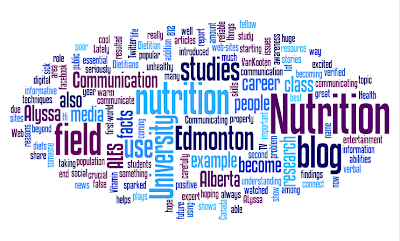As the world moves more and more into a digital era, having an online presence becomes increasingly important. Although there is no replacement for face-to-face interactions, a knowledge and presence on the web is undeniably useful and beneficial for anyone in a scientific career, and most careers. In this class we have touched on so many aspects of the internet that will help me in my future career and as a science student now. I look forward to using what I have learned in this class to build my online presence.
My attitude has been changed quite a lot about the use of social media for work purposes. For instance, in the past few months I have found countless blogs about topics I find interesting, and also relate to Nutrition. For example, nutritionunplugged.com is written by a registered dietician, and the blog has tons of useful tips for food and health. Some of my favourite topics that we have learned about this semester have been Google documents, CV writing, Wikipedia articles and public speaking. I loved the lesson on Google documents because I truly believe they are the future of projects and sharing. In fact, for a group project in another class we used Google documents to write almost the entire thing. It was easy to give feedback on my group member’s writing, editing was easy and receiving feedback was great. I also enjoyed learning about CV’s because I had never heard of them before. I was only familiar with a traditional resume, and the idea of a more interesting way to present your information was intriguing. My favourite assignment was definitely the Wikipedia stub article assignment. I feel like I contributed to the world just a little bit with my article and I know that many people will see what I have written. My favourite all time lesson was the one about public speaking. I loved doing Pecha Kucha in the lab also. Being able to speak, and having people listen to what I have to say, is such a privilege! And I would be lying if I said I didn’t like the attention.
Overall I found that I learned a lot about social networking, and general internet trends that can help me in my future career. I went into the class thinking I knew plenty about social networking, but all I really knew about was Facebook. Now, I can’t promise that I will use my Twitter account much after this class, because I found it hard to connect to professionals in my field, but it was really fun and easy to connect with others in the class. For instance, I found yet another nutrition student in our class, Steph, and she agrees that what we have learned in this class can give us an edge in the classroom and in the professional world. One thing I found very interesting about this class is the attention it got from other students around the school. Many of my friends had heard about the so-called “Twitter Class” before I had even mentioned ALES 204. It was cool to see the impact this class had on my friends and peers from other classes, and I bet not many other classes have had such an impact on the school community as this one has. This class has not only impacted the university, it has reached all over the world, mainly via the class blog. It was cool to see how many people I reached with just my blog. As of right now, 418 people have viewed my blog. It is astounding to me just how much of an impact my little blog has had! It makes me hopeful about what kind of difference I can make in the world, and social media and the internet are the first step.
Some Stats from December 5, 2011.
The graph is of views in the past few months and the number stats do not include my own views.
Below is a list of my classmate's blogs that I have commented on:










